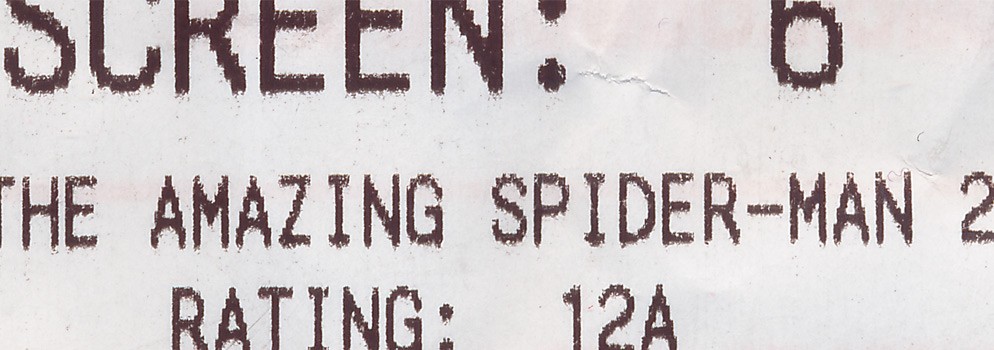The Amazing Spider-Man 2

The sound of one hand applauding its own work
There was zero reason to even discuss the inert polygon rendering that Spiderman 2, about as much, measured in reason-ons, or reasonosity, as I had to see it. Not much point in measuring, the amount is always zero. Even after the credits rolled and it was revealed that it was yet another byproduct of the Lost Hydra, I was too plussed to be nonplussed, or flammable to be inflammable.

But in transcribing my notes, which I do no matter what, I noted yet another baffling Situationus ex Machina, and I felt the urge to write about one specific aspect of the film. This became even more imperative in the discovery that we had received the film two weeks before you in the US, which meant spoiling at least some of the experience for those of you who also have zero reason-ades to see it, but still go anyway. Well, kind of spoil it, because the twist, or story, or situation is convoluted or boring or pointless enough only be noticed in retrospect, and only after reading what’s happened written down in front of you.
Now I’ve probably had many names for this, I think one of them is A Scene Where-ism, so let’s stick with that. The point being that you have an idea for a scene, and then another idea and then another, and you stick them all together and, like six different jigsaw puzzles, an incomplete set of tinker toys, and some mud, I guess, and suddenly everything fits perfectly. Show to your mommy. She thinks you’re genius.
Situation 1: His father has a secret! Oscorp was doing human experiments! But we covered that in the first one? And everyone on the planet knows about it? A ha, the writers counter: since when did secrets have anything to do with people knowing things?
Situation 2: He’s on a plane! Well that’s bad. I mean, if some bad guy boarded, he could kill them right away, get away with it, and prevent the secret that everyone knows anyway about from getting out. Which it already did. Or he could wait until they take off and kill them after they’ve sent the secret. This one gets a pass because we’ve seen it so many times in other movies, it can be assumed the villain saw those films and just thought it was a good idea. Like going to investigate noises in the attic, or ignoring sinister music cues.\
Since when did knowing things have anything to do with knowing things?
Situation 3: His parents have disappeared. Classic. So many ways to resolve it. How about killing him? Which they did. This would count as a spoiler, but it happens in the first five minutes. But if we kill him, someone might object, then how will his son ever grieve, not knowing if he’s alive or dead? Well, the movie knows he’s dead, so it follows that his son does. Think about it. Since when did knowing things have anything to do with knowing things?
Situation 4: The Status bar! Everyone who loves computers taking a while loves status bars. It’s a given.
Situation 5: The Mystery! Ahh, the search for the missing family that’s already dead. But before I can act like I know this even though there’s no way I can, I have to search for them. But, say the screenwriters, that would be too easy. You should always put obstacles is the way of your heroes. And they came up with a doozy for this one. He can’t search for his missing parents because…he doesn’t feel like it. It’s diabolical! But our hero is no slouch, and soon comes up with an equally clever way to overcome this obstacle.
He starts to feel like it.
Situation 6: The Secret Lair! Hey, abandoned subway stations are a smart choice for a secret lab. There’s no way any homeless folks would camp out there; it’s too visually retro. And yes, we all know it would be more practical to put up a door instead of an hydraulic lifty subway car, but that’s what you get for building without permits. People always make fun of bureaucracy, but it exists for a reason, people.
And all these situations create, well, can’t call it drama, as that implies a sense of tension, as opposed to the movie saying now this is going to happen and then it does. But the act theory of writing does offer situation, which is as comforting as the blanket that wraps around you as you fall asleep watching Boardwalk Empire. But, in reflection, let’s add them up, shall we? Peter’s father, the man who created the spider serum which can only be used by someone in his own blood line, has a son who, being the only person in the world that the serum will work for, happens to be randomly bitten twelve years later. Out of a city of twelve million people, he’s the one..sorry. Sorry. Already off track on another one. Stay focused!
Okay, Peter’s father has a secret. Let’s not go into what that might be, and how it has nothing to do with the outcome of the…Sorry. Sorry. Start again.

Besides being in theater 6, let’s discuss the How To Train Your Dragon 2 teaser, which is I-Timed-It-Seven-Minutes-Long. I genuinely got out of my seat to see if I was in the wrong theater when it ended. What’s happening???????!!!!!, I asked in a reasonable tone of voice.
He gets on the plane while the baddie carefully takes off, knowing that at any minute, godammit, already did that. Sorry. Okay, Peter’s father sends a video confession to the secret lab with the status bar and then dies. All the situations happened in order, and cue the sound of ‘that’s that’ hand clap. And, rather disturbingly, the sound of applause at the end of the film, which I haven’t heard in a long while. Hey, they were forced to watch it in theater 6. Maybe they were applauding themselves.
But after all the other things, all the other things, what we’re left with is that the film has killed him to send the file to a place – the lab – that already contains all the information, nay, quite a bit more, than any video confession, making it redundant. In fact, the only thing we learn is the preposterous idea that Peter Parker is the only one that could have become Spiderman because of his father who created it but is dead but he doesn’t know that, but acts like he does.
In going over the notes, which let’s face it, not many of you are taking, I think I finally think we can credit what a successful film should be: amnesia inducing. This is actually a pretty good idea. You are getting sleepy, very sleepy means that all the distraction and attempts to figure out what’s going on provide a mildly distracting time. The SAT question: what Mr. Michael Bay is for visual sense, the Lost Hydra is for plot. The advantage being, that’s right, advantage, that you walk out not being able to remember what hell happened, fogged by the same amnesia that seems to plague the characters. It’s as if you got some genetic disease, tried the spider venom for a cure, it turned you into a green guy because you’re not Peter Parker, which killed you, but then you forgot to tell your son this, who has the same disease, so he turns into the Green Goblin, but to save himself he uses some mechanical healing suit that you also knew about. Why didn’t you tell him about that, when the one motive, the one motive IS THAT YOU WANT TO SAVE HIM?
Crap. I had this great idea about how these movies work, but I’ve totally forgotten. What’s…a film?
-$5.96
The Lonely Comments Section

 [logo]
[logo]